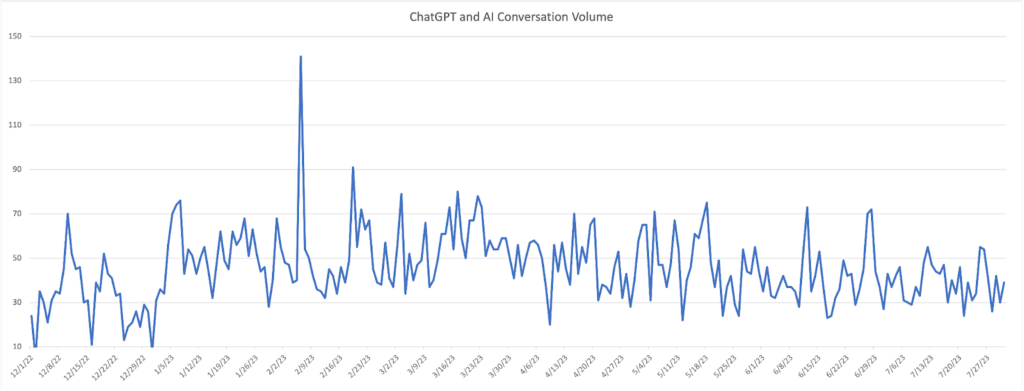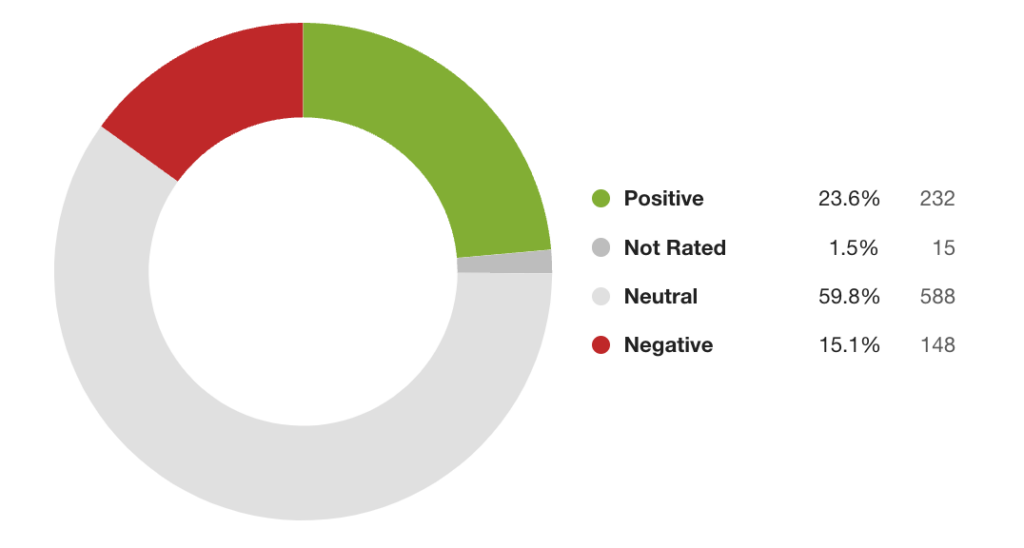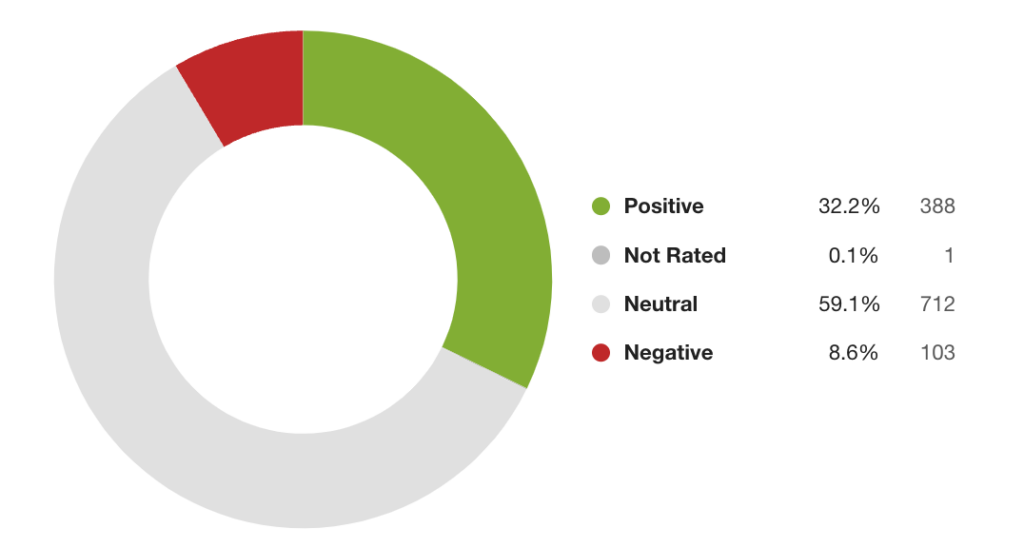Tools & Resources: AI in Education September 2023 Update
In the 10 months since the emergence of increasingly user-friendly AI tools (including ChatGPT), educators have used digital spaces like Twitter (now “X”) and Facebook groups to discuss problems of practice, ask questions, and share innovative lesson planning, professional development, and student engagement resources – all focused on the topic of potential applications of AI. These conversations signal an enormous hunger in educator communities across content areas and grade levels for immediately implementable tools, best practices, and professional development resources around the intersection of AI and education.
Sentiment Analysis
Overall, there was a 22.48% increase in volume of month-by-month conversations focused on “ChatGPT” and “AI” from December 2022 (983) to July 2023 (1,204). This increase includes a spike on Feb. 6, 2023 following an educator-led #ReThinkLearning chat focused on AI, highlighting teachers’ growing interest in discussing AI and its place in the classroom.

This chart represents conversation volume collected from a sample of roughly 5,000 educators on “X” from December 2022 to July 2023.
From December of 2022 to July of 2023, the percentage of the conversation focused on AI that had a positive association (vs. negative or neutral) grew from 24% to 32%. This suggests that as AI becomes increasingly integrated and accepted by students, educators, families, buildings, and districts (see this New York Times article on districts repealing ChatGPT bans from August 2023), educators are more likely to embrace AI as a planning tool and “partner.”
December 2022 
July 2023 
Social Listening Toplines: Educators’ Thoughts On AI
The volume of teachers outwardly seeking AI-related strategies and inspiration has increased in recent months, particularly as the back-to-school season has begun. In addition to educators exploring AI tools individually, teachers have also expressed interest in professional learning opportunities centered around AI. Some school leaders feel as though the education industry is moving from “the age of IT to the age of AI” and are already holding AI-focused PD sessions.
Although teachers do seem more willing and excited to explore engaging with AI, there are still educators that remain hesitant and unsure about the ways that AI will impact the teaching profession. These concerns include:
- A lack of equity and potential for racial discrimination in AI technology.
- AI tools being used to generate low-quality assignments, feedback, and “busy work.”
- AI tools being used as a reason for teachers to avoid assigning certain types of content, like essays.
- AI tools stunt students’ growth in areas relating to writing and creativity.
- Administration introducing AI tools without connecting it to teachers’ pedagogy.
Educator-created resources centered on AI seem to resonate with and engage teachers, including books like Artificial Intelligence To Streamline Your Teacher Life: The ChatGPT Guide for Educators and teacher-led professional development sessions like the one featured here by Alice Keeler.
With the 2023-2024 school year underway, some teachers are sharing that they are utilizing AI in classroom activities and addressing responsible AI use with their students. A consistent trend has appeared of educators using ChatGPT to support the creation of resources like substitute plans or grading rubrics.
Responses to a curated engagement question shared by NCTM in partnership with T2T – “What’s the top question on your mind when it comes to how AI might change teaching and learning math?” – largely express an attitude of cautious interest and curiosity when it comes to AI.
- “Emphasize the purpose of taking a math course – the purpose is not to get right answers on the test, it’s to understand the math, but traditionally we’ve acknowledged that getting right answers on the test is a way to demonstrate an understanding of math. I’m in the camp of AI in math (i.e. solving apps) is here and not going away, so trying to fight it creates stress for everyone involved, so let’s not fight it, let’s embrace it. I think a great activity would be to split classes into groups (if they aren’t already) and have each group use a different solving app and then present to the class (I use “present” loosely, copying work onto a poster to be shared is fine) and then we analyze the similarities and differences in approaches as a class.”
- “I would like to know how to use ChatGPT for effective lesson planning. I have heard some good things for English teachers and I think there should be something good for math.”
- “I want to know how to integrate it into math instruction to make the experience better for students.”
AI and Lesson Planning
- Discussion of the potential lesson planning applications of AI is prominent across digital spaces.“I just used ChatGPT to write an outline for a lesson and it helped give a rough outline of where I should begin, what I should do and how I should end. I still went back and added my own voice and many additional details, but it was a great place to start.” (link)
- “AI for the win! I have just played around with putting in parameters and asking for lesson plans, and within seconds I get something that I can then tweak and ask for another iteration. And every time I have been very specific and gotten great frameworks to build from.” (link)
- “When you design a lesson plan, you always keep in mind that #ChatGPT can help you create differentiated tasks/games for your students and automate certain tasks. There are many examples online if you need inspiration!” (link)
- A Teach Plus Senior Writing Fellow-authored op-ed suggests techniques for partnering with ChatGPT to engage students and plan lessons (link)
AI tools like Schemely, Diffit, and Curipod have been highlighted as effective resources for lesson planning. ChatGPT has also been mentioned as an aid in planning curricula by supporting the creation of lesson plans and classroom activities.
Teachers have shared that using AI for lesson planning can save time and prevent burnout. Some educators, however, have flagged that they’re too overwhelmed to spend capacity learning how to navigate new tools. The limits of AI are also a popular topic of discussion – one teacher shared on “X”: “So far every single time I ask ChatGPT to “make engaging” a lesson for students…it fails big time. You know your students. What interests them? How will you engage them? For now…that task is a human task. (link).
AI and Educational Organizations
Between March and August 2023, various education organizations and publications have disseminated content focused on AI to meet ever-growing demand from the educators in their communities. In August 2023, Education Week collaborated with well-known figures in the ed tech space to share their recommendations for AI tools that can be utilized in the classroom. Educator influencers Larry Ferlazzo, Michelle Shory, and Irina McGrath recommended AI tools including ChatGPT, Microsoft Reading Coach, Diffit, Canva Docs, QuillBot, and Scraft. Teach Plus fellow Ronak Shah also collaborated with Education Week to share his approach to using ChatGPT as an asset in his classroom. In early August 2023, Time Magazine highlighted different ways teachers are using ChatGPT in their classrooms. This article also highlighted the role Facebook groups play in the evolution of AI in teaching. (See MissionWired’s AI Facebook Group Analysis.)
Following the surge of interest in AI, some education organizations are offering professional learning opportunities to equip educators with the tools and expertise they need to utilize AI in their practice. Microsoft Education is offering a free online course to train educators on best practices for using AI. ISTE, Khan Academy, and ETS collaborated with Code.org to present a free, five-session online PD training titled “AI 101 for Teachers.” AI software companies are also communicating with educators as a prime audience, with the tech tool Grammarly offering a webinar focused on implementing generative AI to enhance student learning.
Additionally, We Are Teachers, NCTM, Edutopia, and other peer organizations have made AI a focus area of their content. The educator-moderated #FormativeChat shared a question on AI during an August chat on “X,” asking teachers to share their plans for integrating AI during the upcoming school year.